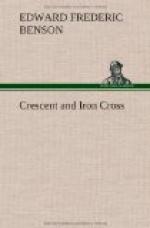Again, the Deutsche Orientbank has made many extensions, and is already financing cotton and wool trade for after the war. The establishment of this provoked much applause in German financial circles, who find it to be an instance of the ’far-reaching and powerful Germano-Austrian unity, which replaces the disunion of Turkish finance.’ This is profoundly true, especially if we omit the word ‘Austrian’ inserted for diplomatic reasons. Again we find Germany advancing L3,000,000 of German paper to the Turkish Government in January 1917, for the payment of supplies they have received from Krupp’s works and (vaguely) for interest to the German Financial Minister. This, too, we may conjecture, is to be redeemed after the war in gold.
In March of this year we find in the report of the Ottoman Bank a German loan of L1,000,000 for the purchase of agricultural implements by Turkey, and this is guaranteed by house-taxes. In all up to that month, as was announced in the Chamber of Deputies at Constantinople, Germany had advanced to Turkey the sum of L142,000,000, entirely, it would seem, in German paper, to be repaid at various dates in gold. The grip, in fact, is a strangle-hold, all for Turkey’s good, as no doubt will prove the ‘New Conventions’ announced by Zimmermann in May 1917, to take the place of the abolished Capitulations, ’which left Turkey at the mercy of predatory Powers who looked for the disruption of the Ottoman Empire.’ Herr Zimmermann does not look for that: he looks for its absorption. And sees it.
The industrial development of Turkey by this benevolent and disinterested Power has been equally thorough and far-reaching, though Germany here has had a certain amount of competition by Hungary to contend against, for Hungary considered that Germany was trespassing on her sphere of interest. But she has been able to make no appreciable headway against her more acute partner, and her application for a monopoly of sugar-production was not favourably received, for Germany already had taken the beet industry well in hand. In Asia Minor the acreage of cultivation early in 1917 had fallen more than 50 per cent. from that under crops before the war, but owing to the importation of machinery from the Central Powers, backed up by a compulsory Agricultural Service Law, which has just been passed, it is hoped that the acreage will be increased this year by something like 30 per cent. The yield per acre also will be greatly increased this year, for Germany has, though needing artificial manures badly herself, sent large quantities into Turkey, where they will be more profitably employed. She has no fear about securing the produce. This augmented yield will, it is true, not be adequate to supply the needs of Turkey, who for the last two years has suffered from very acute food shortage, which in certain districts has amounted to famine and wholesale starvation of the poorer classes. But it is unlikely that their needs will be considered at all, for Germany’s




